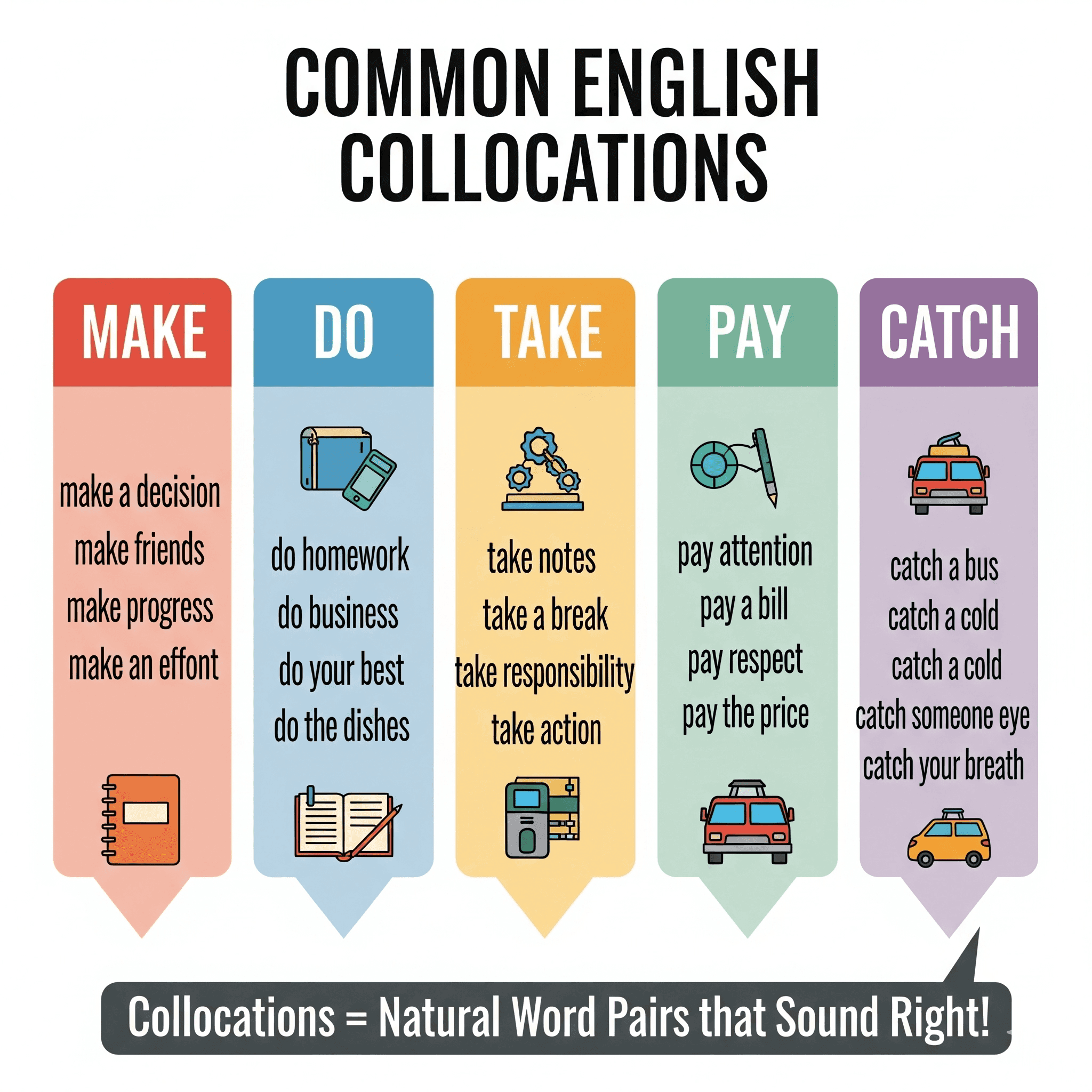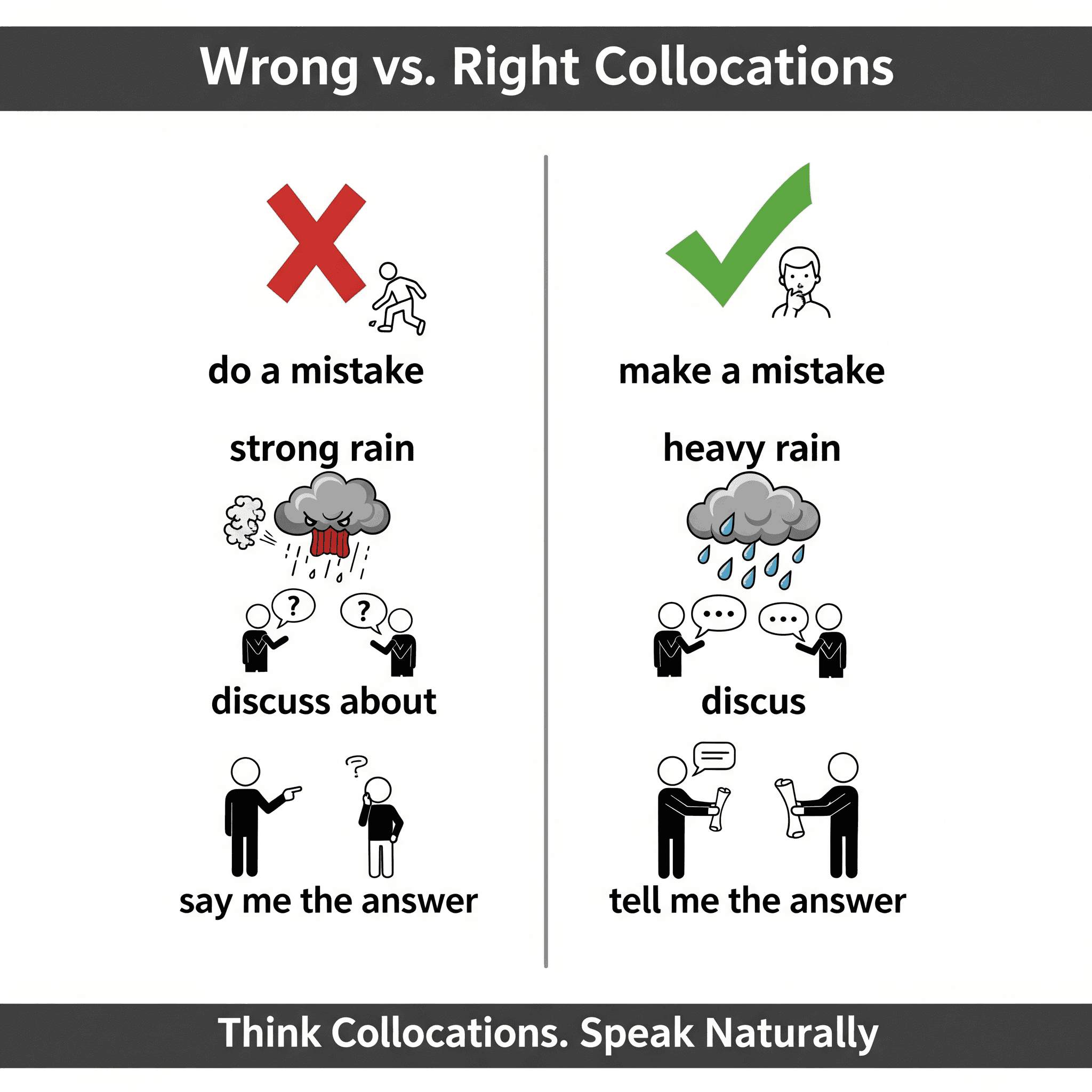Fun with Words: The Ultimate English Collocations Guide for Natural Word Pairs
Discover how collocations make your English sound fluent and natural. This English collocations guide explains common natural word pairs, tips, examples, and tricks to master them.

Collocations - The Secret Ingredient To English Fluency
Why does a native English speaker say “make a decision” instead of “do a decision”? Or “heavy rain” but never “strong rain”?
The answer lies in collocations - natural word pairs that sound “right” together.
This English collocations guide will take you on a fun journey into the world of word pairings. You’ll discover how collocations shape fluent speech, why they matter, and how you can master them. Along the way, we’ll share examples, activities, tips, and a few surprises to keep learning enjoyable.
If you’ve ever wanted your English to sound smoother and more natural, collocations are your secret weapon.
What Are Collocations?
A collocation is a natural combination of words that are often used together. They can be:
Adjective + Noun → strong coffee, heavy rain, fast car
Verb + Noun → make money, take notes, save time
Verb + Preposition → rely on, belong to, look after
Adverb + Adjective → deeply concerned, fully aware, highly unlikely
Think of collocations as word friendships. Certain words “like” each other and often appear side by side.
Why Collocations Matter
Fluency boost: Using natural word pairs helps your speech flow.
Confidence in conversation: You avoid awkward phrasing like “do a mistake.”
Better comprehension: Recognizing collocations improves listening and reading skills.
Professional edge: Collocations are essential in business English (e.g., meet deadlines, conduct research, hold a meeting).
If you want to speak like a native, this English collocations guide will be your roadmap.
Types of Collocations
1. Strong Collocations
Fixed phrases that rarely change. Example: fast food, heavy rain, commit a crime.
2. Weak Collocations
More flexible, but still preferred. Example: good chance, big difference, nice person.
3. Grammatical Collocations
Words paired with prepositions. Example: interested in, capable of, depend on.
4. Idiomatic Collocations
Expressions that carry cultural meaning. Example: break the ice, hit the books, pay attention.

Common English Collocations
Everyday Collocation Examples
Here are some natural word pairs you’ll hear daily:
Make: make a plan, make friends, make progress
Do: do homework, do business, do your best
Take: take notes, take responsibility, take a break
Pay: pay attention, pay a visit, pay the price
Catch: catch a cold, catch someone’s eye, catch a bus
Notice how replacing the verb sounds wrong? We say “take a break” not “do a break.”
Collocations at Work: Professional English
In workplaces, collocations are everywhere:
Business: launch a product, meet a deadline, conduct a meeting
Finance: raise capital, cut costs, make a profit
Communication: give a presentation, raise a concern, reach an agreement
Clapingo Tip
If you’re a working professional in India, practicing natural word pairs during meetings can make you sound more confident and polished. Clapingo’s one-on-one sessions help you use the right collocations in real business conversations.
Fun Ways to Practice Collocations
1. Collocation Bingo
Make a bingo card with words like take, make, do, get. Match them with nouns. Example: take notes, make progress.
2. Fill-in-the-Blank Games
Practice with incomplete sentences:
She always ___ her homework on time. (does)
We need to ___ a decision soon. (make)
3. Collocation Journaling
Keep a diary and replace simple words with natural collocations.
Instead of: “I did an effort to wake up early.”
Write: “I made an effort to wake up early.”
4. Role-Play Practice
Act out daily scenarios with a friend or tutor. For example: ordering food, office discussions, or travel situations.
Did You Know?
The word “strong” collocates with coffee but not with tea. Instead, we say “strong tea” and “weak tea.”
In sports, we “score a goal” but “win a match.”
Native speakers use thousands of collocations daily without even realizing it.

Common Collocation Mistakes
Common Collocation Mistakes
❌ Do a mistake → ✅ Make a mistake
❌ Strong rain → ✅ Heavy rain
❌ Say me the answer → ✅ Tell me the answer
❌ Discuss about the problem → ✅ Discuss the problem
Clapingo Insight
Indian learners often translate directly from their mother tongue, leading to collocation errors. Practicing with an English-speaking mentor on Clapingo helps eliminate these habits.
Collocations vs. Idioms
Collocation: Natural word pair with literal meaning. (Take notes = write notes)
Idiom: Figurative phrase with non-literal meaning. (Break the ice = start conversation)
Collocations make your English natural. Idioms make it colorful.
Advanced Collocations for Professionals
If you’re aiming for next-level English, here are advanced natural word pairs:
Academic: pose a question, provide evidence, reach a conclusion
Business: establish contact, implement a strategy, maximize efficiency
Formal Writing: render obsolete, lend support, raise awareness
These collocations make your speech and writing sound more sophisticated.
Collocations in Daily Life
You use collocations all the time without realizing it!
Here are a few you might say every day:
brush your teeth
take a shower
catch the bus
make breakfast
do the laundry
have lunch
take a nap
Try saying them aloud in full sentences:
“I took a shower and had breakfast before I caught the bus.”
Mini Challenge:
Replace all simple verbs (do, make, get) with collocations for one day.
Collocations for Travel
When traveling, certain combinations just sound natural:
book a flight
pack your bags
catch a train
miss a bus
take a photo
go sightseeing
make a reservation
🌍 Example:
“We made a reservation at a beach resort and caught the flight early.”
Clapingo Practice Idea:
Try travel role-plays with a Clapingo tutor, plan a trip in English using all the collocations above!
Collocations with “Have”
The verb “have” creates hundreds of collocations — here are some common ones:
have breakfast/lunch/dinner
have fun
have a conversation
have a break
have a dream
have a headache
Memory Tip:
Think of “have” as a lifestyle word — anything you experience or enjoy often goes with it.
Collocations for Emotions
Expressing emotions naturally in English depends on using the right pairs:
feel nervous
burst into tears
be deeply moved
express gratitude
lose your temper
build confidence
Example:
“She burst into tears when she felt deeply touched by the speech.”
Did You Know?
Native speakers rarely say “I felt very sad” — they say “I felt heartbroken.”
Collocations for Technology & Work
Modern English is full of collocations related to tech and productivity:
send an email
upload a file
join a meeting
take a screenshot
set a reminder
share a document
Clapingo Workplace Tip:
When you practice workplace English on Clapingo, focus on collocations you use daily like “schedule a call” or “share feedback.” It’s the easiest way to sound fluent fast.
Collocations for Success & Growth
When you talk about improvement or ambition, these natural word pairs fit perfectly:
set goals
achieve success
reach potential
make progress
overcome challenges
gain experience
Example:
“She set clear goals and made steady progress in her English fluency.”
Collocations for Apologies & Requests
Sound more polite and natural with these:
apologize sincerely
make an excuse
ask a favor
request permission
offer help
express regret
Example:
“I apologize sincerely for the delay and request your understanding.”
Clapingo Practice Task:
Role-play a workplace apology or customer service call with your tutor to master polite tone.
Collocations for Health & Fitness
Fitness lovers, here’s your list:
eat healthy
go jogging
do yoga
stay fit
lose weight
build muscle
follow a diet
Example:
“I’ve been doing yoga daily to stay fit and build muscle.”
Cultural Collocations in Indian English 🇮🇳
Some collocations are influenced by local culture and usage. While not always wrong, they can sound “Indianized.”
❌ Open the TV → ✅ Turn on the TV
❌ Discuss about → ✅ Discuss
❌ Reply back → ✅ Reply
✅ Take leave (correct and common in Indian offices!)
Clapingo Insight:
Indian professionals often use literal translations. Clapingo sessions help you unlearn and replace them with globally accepted expressions.
The Psychology of Collocations
Collocations help your brain store chunks of language instead of single words.
This makes speaking smoother because your mind recalls whole phrases instantly.
Example:
Instead of translating “do homework” word by word, your brain retrieves it as one sound pattern — “do homework.”
Clapingo Advantage:
Our interactive speaking sessions are designed to help learners think in chunks — the key to fluent English.
Bonus Section: Collocation Quiz
Match the correct collocation:
___ progress → (make / do)
___ your homework → (do / make)
___ a complaint → (file / submit)
___ a promise → (keep / hold)
___ feedback → (give / tell)
✅ Answers: 1. make, 2. do, 3. file, 4. keep, 5. give
Collocation Building Exercise
Try replacing plain verbs with natural pairs:
Plain Sentence | Improved Sentence |
|---|---|
I did a mistake. | I made a mistake. |
She said me the answer. | She told me the answer. |
We did a party. | We had a party. |
He did a decision. | He made a decision. |
I took a photo. | Perfect as is! ✅ |
Collocation Practice Routine
A daily 10-minute routine to internalize natural pairs:
Read one news article and underline collocations.
Write 5 sentences using new pairs.
Speak them aloud in front of a mirror.
Practice in a real conversation on Clapingo.
“Collocations are not grammar rules, they’re the heartbeat of natural English.”
Master them daily, one phrase at a time.
Tips and Tricks to Master Collocations
Read Widely – Notice recurring word pairs in newspapers, blogs, and books.
Listen Actively – Pay attention to how speakers combine words in movies or podcasts.
Practice in Context – Use collocations in real-life sentences, not isolated lists.
Use Flashcards – Create digital or physical flashcards for quick revision.
Speak Daily – Incorporate at least 5 new collocations into your daily conversations.
Learn Collocations in Real Conversations
Learning collocations isn’t just about memorizing lists; it’s about using them naturally.
With Clapingo’spersonalized one-on-one English sessions, you can:
Practice collocations in real contexts
Receive instant corrections from experts
Role-play office, interview, or travel scenarios
Sound confident in professional English
Try a demo session today and see how much smoother your English can sound.
Conclusion
Mastering collocations is like unlocking the rhythm of English. They are the natural word pairs that give your language fluency, confidence, and a professional touch.
This English collocations guide showed you examples, types, mistakes, and practice tips. Now it’s your turn to use them daily.
Remember: Don’t just learn English. Live it. Speak it. Pair it right.
Ready to master collocations? Book a Clapingo session today and practice them with real mentors.
Read Also: Fun with Words: 50 Loanwords and Loan Phrases in English
Comments
Your comment has been submitted